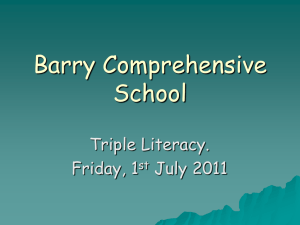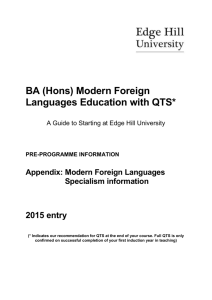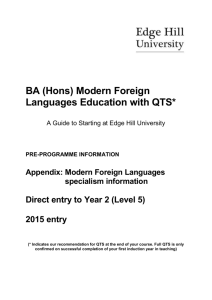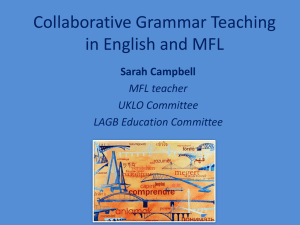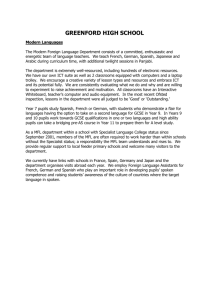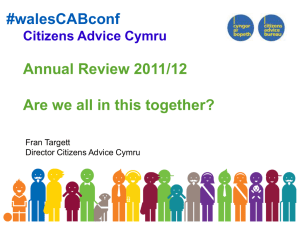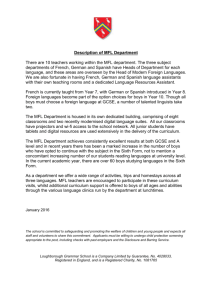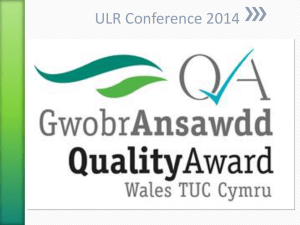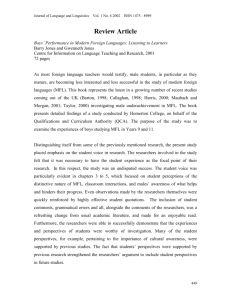Global Futures * a plan to improve and promote MFL in Wales
advertisement
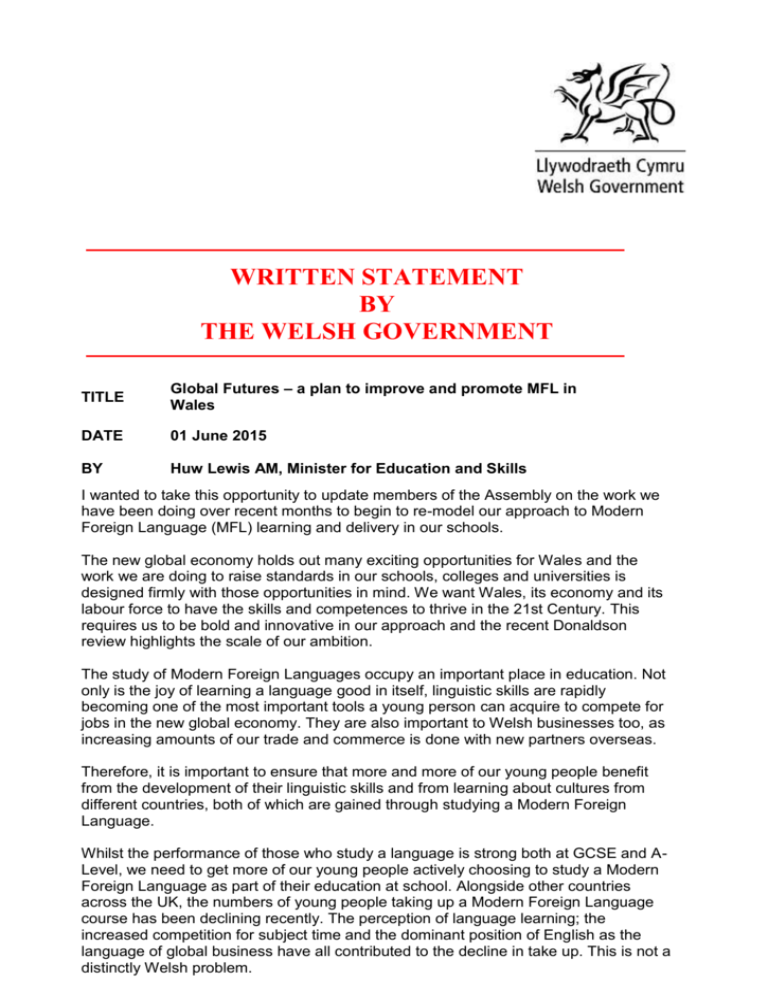
WRITTEN STATEMENT BY THE WELSH GOVERNMENT TITLE Global Futures – a plan to improve and promote MFL in Wales DATE 01 June 2015 BY Huw Lewis AM, Minister for Education and Skills I wanted to take this opportunity to update members of the Assembly on the work we have been doing over recent months to begin to re-model our approach to Modern Foreign Language (MFL) learning and delivery in our schools. The new global economy holds out many exciting opportunities for Wales and the work we are doing to raise standards in our schools, colleges and universities is designed firmly with those opportunities in mind. We want Wales, its economy and its labour force to have the skills and competences to thrive in the 21st Century. This requires us to be bold and innovative in our approach and the recent Donaldson review highlights the scale of our ambition. The study of Modern Foreign Languages occupy an important place in education. Not only is the joy of learning a language good in itself, linguistic skills are rapidly becoming one of the most important tools a young person can acquire to compete for jobs in the new global economy. They are also important to Welsh businesses too, as increasing amounts of our trade and commerce is done with new partners overseas. Therefore, it is important to ensure that more and more of our young people benefit from the development of their linguistic skills and from learning about cultures from different countries, both of which are gained through studying a Modern Foreign Language. Whilst the performance of those who study a language is strong both at GCSE and ALevel, we need to get more of our young people actively choosing to study a Modern Foreign Language as part of their education at school. Alongside other countries across the UK, the numbers of young people taking up a Modern Foreign Language course has been declining recently. The perception of language learning; the increased competition for subject time and the dominant position of English as the language of global business have all contributed to the decline in take up. This is not a distinctly Welsh problem. Whilst I would like to put on record my thanks to CILT Cymru for their support in promoting MFL subjects over recent years, it has increasingly been my view that we cannot carry on with business as usual and need a new approach to Modern Foreign Language learning in Wales. It is now time to think anew with a fresh approach to the Welsh Government’s promotion of MFL subjects in Wales and I am pleased to announce today the first steps in that new plan to support and promote the teaching of Modern Foreign Language subjects in our schools. From the end of this academic year I will be replacing CILT Cymru with the Improving and Promoting Modern Foreign Languages Plan, which will come into effect from September 2015. The Plan will see a new approach to MFL in schools with a secondary school in each consortium becoming a Modern Foreign Language Centre of Excellence, tasked with working in partnership with other secondary schools and primary schools in their region. I intend to link this closely to the work I have begun in implementing the 'New Deal' for the professional education workforce in Wales with Continuing Professional Development activities being provided to each MFL Centre of Excellence through a new partnership with existing European language institutes and our universities to support practitioners and improve teaching. Schools within each MFL Centre of Excellence will benefit from school to school based support which I want to provide a sustainable and self improving model of working for the future. The Plan also includes the establishment of a mentoring programme targeted at Key Stage 3 pupils that will raise the profile of MFL subjects and ensure learners are aware of the benefits of MFL study, both in terms of accessing higher education and in securing employment. I intend these measures to be the start of a new approach to Modern Foreign Language learning that will improve the learner experience of MFL subjects in our schools, knowing that this is one of the most prominent reasons putting off young people from studying a Modern Foreign Language. I am investing £480k in 2015/16 to support the Improving and Promoting Modern Foreign Languages Plan. In addition to this, regional education consortia have been asked to submit proposals to Welsh Government on how they can work in new and creative partnerships to take this agenda forward. I am pleased to announce that the Plan will be overseen by a Modern Foreign Language steering group made up of experts from schools, universities, Estyn, language institutes (Alliance Francaise, Institute Francais, Goethe Institut, Confucius Institute and the education departments of the Spanish Embassy and the office of the Italian Consulate General in London) and education consortia and will be Chaired by Mr Glynn Downs, Bishop of Llandaff Church in Wales High School. The group will oversee the implementation of the plan, including agreeing the strategy for promoting MFL subjects and the work of the Centres of Excellence. The first meeting of the MFL steering group will take place on 4 June 2015. In particular, I will be asking the steering group to examine and report back to me on how we can incentivise undergraduates and postgraduates to work with our new Centres of Excellence as well as how we can engage partners such as the BBC and the Open University in usefully harnessing new digital technologies to improve language learning for both pupils and teachers. Finally, it is with great pleasure that I can inform you that Wales will host for the first time a head teacher conference on the need for German in schools and the 12th German Teacher Award Ceremony 2015. The event is jointly organised by the Embassy of the Federal Republic of Germany, the Goethe Institut London, the Welsh Government and the British Council. There are no easy answers to the challenge we face of increasing the numbers of young people studying a Modern Foreign Language. At a time of stretched resources, it will mean us forming new and innovative partnerships with the organisations already working in Wales who have the skills, experience and know how in language learning. As a bilingual country we already have a great deal of knowledge in our primary and secondary schools sector and in our university language departments about how best to learn and teach a new language. Within our system we now need to put this knowledge to a better, more joined up use to ensure that we deliver the increase in confident linguists our economy and society would all greatly benefit from.

